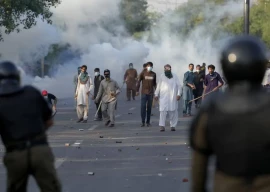
Some children in the lane played along, pretending to be wounded. Smirking after successfully hitting a ‘target’, Asghar would run ahead to find a new group of victims. For an outsider the game would seem dark and dangerous for children to be playing in the narrow streets. But for those living in the impoverished area of Katti Pahari, violence is a big part of what its children have seen and heard in their lives so far.
But what is fun and games now, will prove frustrating as Asghar grows older and either pursues an education or tries to find employment. This neighbourhood has won an unfortunate reputation of violence, which is affecting their ability to find jobs. Businesses don’t want to employ people who won’t be able to leave their homes because bullets are whizzing past their windows.
The director for the Orangi Pilot Project Research and Training Institute, Perween Rahman, explains why. “Katti Pahari has been a place of a lot of violence and even when people want to, they are unable to reach work [elsewhere in the city when it breaks out].”
This summer was particularly bad. In July, over 100 people died across the city, many of them from this neighbourhood. As a result, many families have considered moving out of the area. Naseem, 50, belongs to one of the few Urdu-speaking families still living there, and the only one in that lane. “My husband and I moved here over 30 years ago, we saw this whole place develop... and then deteriorate.”
Fed up with the situation, both of Naseem’s children moved out a few years ago. “My daughter and her husband moved to Korangi,” she said. Like her husband, Naseem’s son-in-law is a security guard. But even he would find himself stuck at home when it was too violent to venture out. “His pay would get docked when he couldn’t turn up for work.” Her son, who works in a garment factory, also moved to Golimar after growing frustrated with the constant stress.
But it is the people on daily wages who are among the most affected. Asif, 17, lost his brother Nadir in the July violence. Nadir was the breadwinner for the family of six after their father passed away. Now Asif’s mother and sisters get so frightened on the slightest hint of unrest that they refuse to let him leave the house. But then he can’t feed the family if he misses even a day at a pillow factory where he works.
“As it is, it is so difficult to find a job these days,” Asif said. “The first thing most employers want to know now is where you live. As soon as you say Katti Pahari, you know they have made up their minds not to hire you.”
OPP’s Rahman argues that while there is no prejudice against the residents of this particular area employers look at the situation practically as well. “For example, if I need somebody at home to take care of my mother, no matter how much I may want to employ someone from the area, I have to consider whether or not they will be able to uphold the commitment to make it to work every day.”
What then is the solution? “It has to be a political one,” Rahman says firmly. “Many times it [violence] is made to appear as if it is an ethnic battle while it’s not.”
As for the suggestions of neighbourhood or community watches, Rahman recommends that political workers on the ground be involved for the initiative to be successful. “All this talk of Katti Pahari being the hub of violence is mostly because of two political parties and personal enmities coloured as ethnic,” says Irfan, a resident. “The poor people end up suffering.”
Published in The Express Tribune, December 6th, 2011.






























1713853507-0/MalalaHilary-(2)1713853507-0-270x192.webp)







COMMENTS
Comments are moderated and generally will be posted if they are on-topic and not abusive.
For more information, please see our Comments FAQ